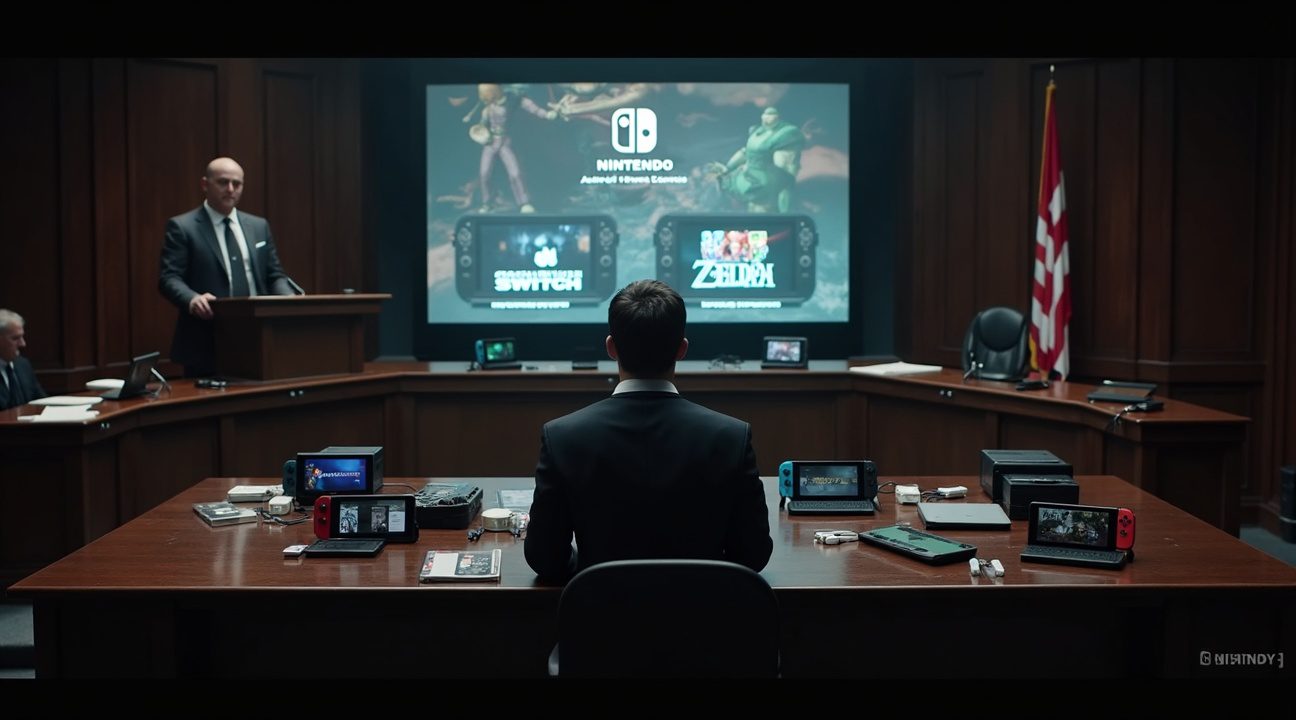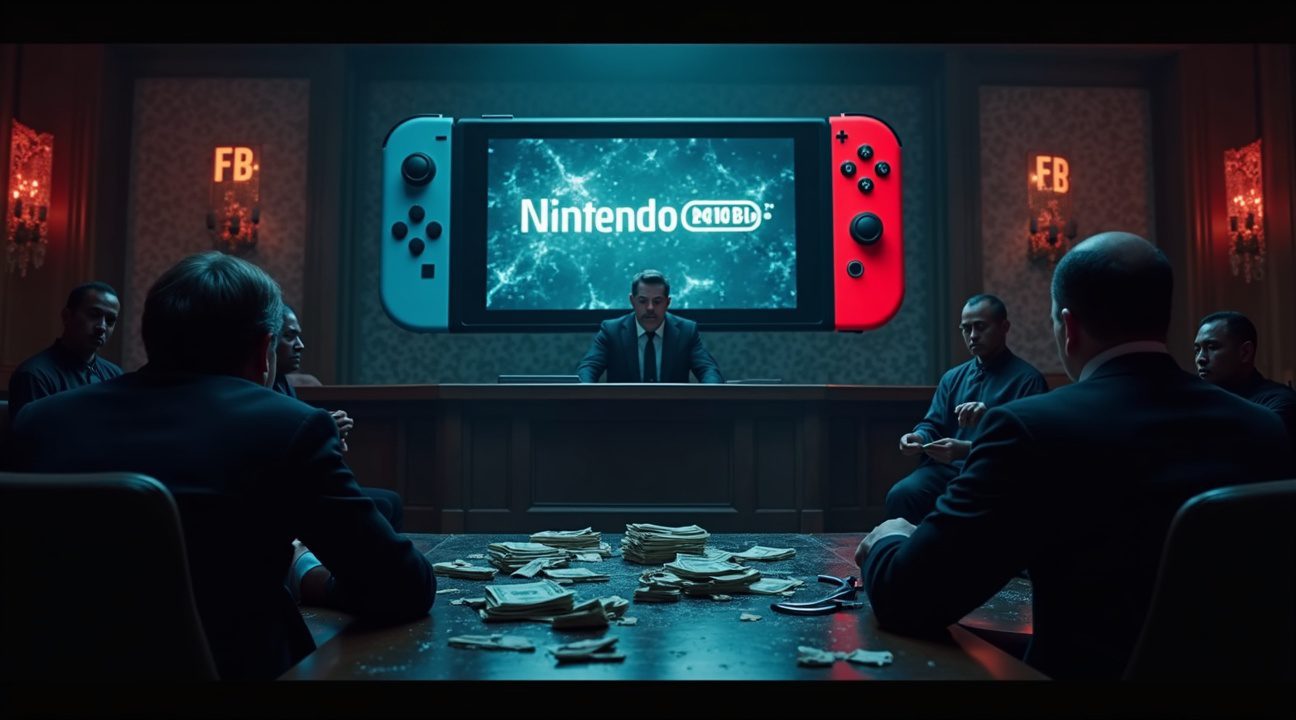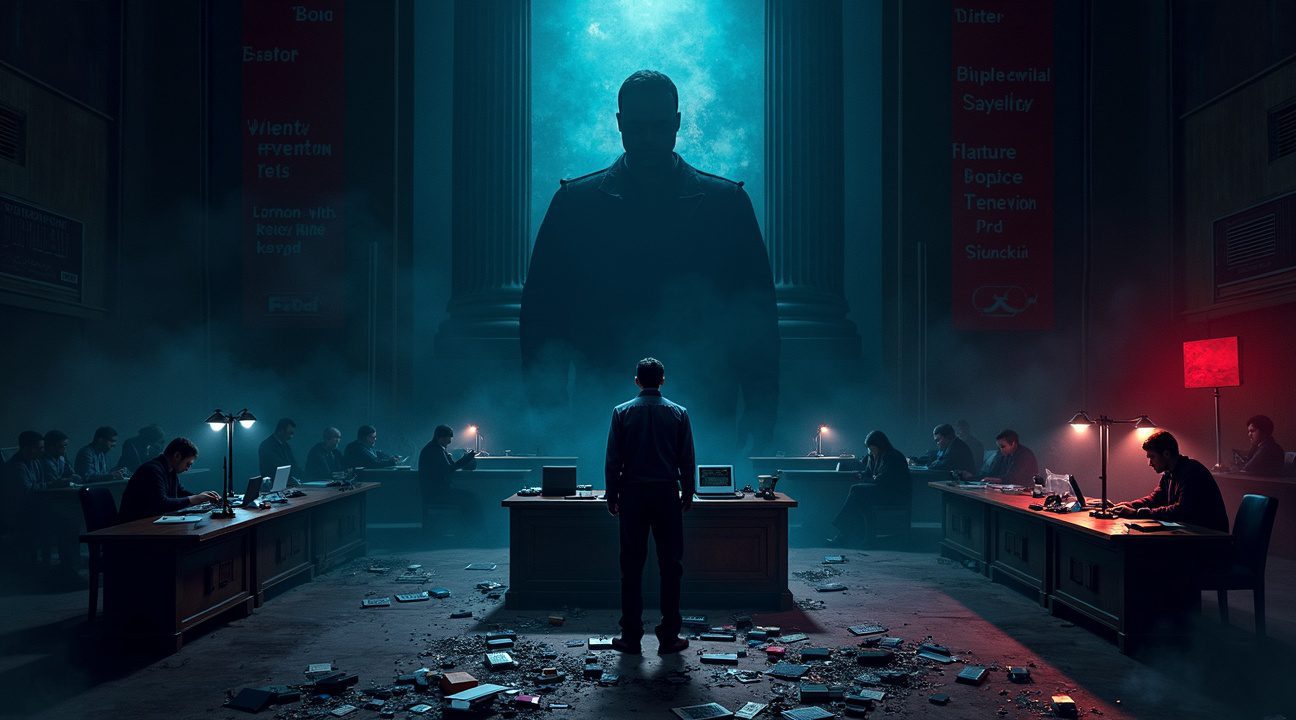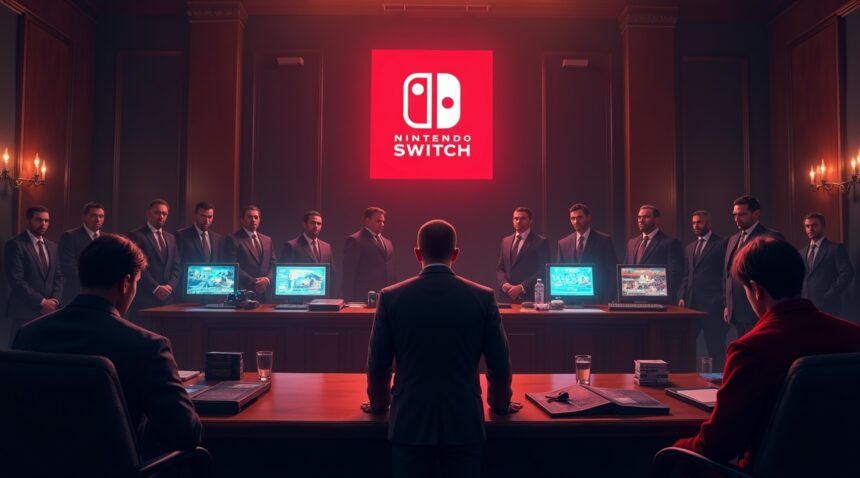Nintendo has successfully secured a $2 million settlement against Switch modder Ryan Daly, who operated an extensive piracy operation involving modified consoles with stolen games and hardware designed to bypass DRM protections.
Key Takeaways
- Nintendo secured a $2 million settlement against Ryan Daly for selling modified Nintendo Switch consoles that were pre-loaded with pirated games and offering illegal mail-in modding services.
- This case sets a critical legal precedent showing that engaging in console modification for piracy purposes can lead to substantial financial consequences, impacting both commercial entities and hobbyists.
- The victory aligns with Nintendo’s ongoing enforcement pattern, including prior legal actions such as a $2.4 million settlement from the developers of the Yuzu emulator and a $14.5 million judgment against Team Xecuter member Gary Bowser.
- The upcoming Switch 2 console will reportedly include advanced hardware-level protections, as well as updated user agreements that support permanent console bans and potential legal enforcement if unauthorized modifications are detected.
- The broadened legal interpretation of modding activities raises concerns for legitimate communities involved in game preservation, homebrew development, and academic research, as these activities often occupy legally grey areas.
Implications for the Modding Community
This case marks a heightened era of legal accountability for individuals and organizations involved in console modding. With courts supporting strict penalties, modders now face a clearer and more severe legal environment where the risks extend far beyond cease-and-desist warnings.
Broader Impact on Game Preservation and Research
While Nintendo’s win underscores its commitment to intellectual property rights, critics argue that such legal strictness may hinder efforts in game preservation and the academic study of console software architecture. The decision thus brings to the forefront critical questions about fair use, digital rights, and what constitutes lawful tinkering.
Nintendo’s Case Against the Modded Hardware Operation
Nintendo built its case around Ryan Daly’s extensive modding operation that went far beyond simple hardware modifications. The gaming giant alleged Daly ran a comprehensive piracy business that sold modified Switch systems pre-loaded with stolen games, distributed specialized piracy hardware, and offered mail-in modification services to customers.
The Scope of Alleged Piracy Activities
Daly’s operation centered on several key activities that Nintendo classified as copyright violations under the Digital Millennium Copyright Act. The company alleged he actively sold complete modified Switch systems that came equipped with pirated versions of Nintendo’s most valuable intellectual properties. These systems reportedly included unauthorized copies of flagship titles such as Super Mario, The Legend of Zelda, and Metroid games.
Beyond selling pre-modified systems, Nintendo claimed Daly operated a mail-in service where customers could send their legitimate Switch consoles to receive modifications. This service allegedly included installing pirated games directly onto the hardware before returning the systems to customers. Nintendo argued this created a streamlined pipeline for copyright infringement on a commercial scale.
The case also focused on Daly’s distribution of specialized piracy-enabling hardware. Key products included:
- MiG Switch devices that allowed users to run unauthorized software
- MiG Dumper tools for extracting game data
- Custom mod chips designed to bypass Nintendo’s security measures
- Flash cartridges capable of storing and running pirated content
Nintendo maintained that Daly’s activities represented both hardware-based circumvention of copy protection and direct distribution of copyrighted digital content. The company argued this dual approach made the operation particularly damaging to their business model and intellectual property rights.
The court ultimately agreed with Nintendo’s assessment, finding that Daly’s activities caused significant and irreparable harm to the company. This determination proved crucial in establishing the severity of the copyright violations and justified the substantial financial penalties imposed in the settlement.
This case follows Nintendo’s broader strategy of pursuing legal action against emulation and modding operations that facilitate piracy. The company previously secured a significant victory in its lawsuit against Yuzu emulator developers, demonstrating its commitment to protecting its intellectual property through the courts.
The hardware modification industry has faced increasing scrutiny as Nintendo continues to demonstrate its willingness to pursue both individual modders and larger commercial operations that profit from circumventing its copy protection systems.

Nintendo’s Escalating War Against Switch Piracy
Nintendo has dramatically intensified its legal campaign against Switch piracy operations, demonstrating an unwavering commitment to protecting its intellectual property through aggressive litigation and collaboration with law enforcement agencies worldwide.
Major Settlement Victories
The gaming giant secured a significant victory in March 2024 when it won a $2.4 million settlement against Tropic Haze, the developers behind the popular Yuzu Switch emulator. This settlement didn’t just result in monetary compensation—it also established a permanent injunction against the software and forced its complete discontinuation. The Yuzu case represents one of Nintendo’s most prominent legal wins against emulation software, setting a precedent for future enforcement actions.
Prior to the Yuzu settlement, Nintendo achieved another substantial legal victory in the Gary Bowser case involving Team Xecuter. Bowser faced serious consequences for his involvement in operating piracy websites and hardware, ultimately owing Nintendo $14.5 million and serving prison time. These high-profile cases demonstrate Nintendo’s willingness to pursue maximum penalties against individuals and organizations that profit from piracy activities.
International Law Enforcement Collaboration
Nintendo’s enforcement strategy extends beyond civil litigation into criminal prosecution through partnerships with international law enforcement agencies. The FBI and Dutch authorities have actively collaborated with Nintendo to dismantle major ROM piracy networks, resulting in the takedown of several prominent piracy sites that hosted unauthorized Nintendo game files.
These coordinated efforts have also led to the shutdown of other Switch emulator projects, creating a chilling effect across the homebrew and emulation communities. Law enforcement agencies treat these operations seriously, recognizing the substantial financial damage that piracy inflicts on legitimate game developers and publishers.
The company’s legal team has systematically targeted both the technical infrastructure supporting piracy and the individuals profiting from these operations. By combining civil lawsuits seeking monetary damages with criminal referrals that can result in imprisonment, Nintendo has created a comprehensive deterrent strategy.
This aggressive approach reflects Nintendo’s broader philosophy that intellectual property protection requires active enforcement rather than passive acceptance of piracy as an inevitable cost of doing business. Each successful case builds legal precedent and sends a clear message to potential infringers about the serious consequences of unauthorized distribution of Nintendo’s copyrighted content.
The ongoing crackdown suggests Nintendo will continue pursuing legal action against Switch modding operations, emulator developers, and ROM distribution networks as part of its comprehensive anti-piracy strategy.

Switch 2 Anti-Piracy Technology and Updated Console Policies
Nintendo has significantly strengthened its approach to preventing unauthorized modifications with the upcoming Switch 2, implementing both technical and legal measures that represent a major escalation in anti-piracy efforts. The company’s recent experiences with high-profile emulation cases, including the Yuzu settlement worth $2.4 million, have clearly influenced these aggressive new policies.
Hardware-Level Security Enhancements
The Switch 2 incorporates advanced security features that make traditional modding methods significantly more challenging. Nintendo has clearly learned from the original Switch’s vulnerabilities, particularly the Tegra X1 chip’s bootrom exploit that enabled widespread homebrew development. The new console reportedly features enhanced encryption protocols, improved secure boot processes, and additional hardware-based protections that create multiple layers of security.
These technical improvements don’t just make modding harder – they make it exponentially more complex and risky. Traditional entry points that modders relied on have been eliminated or secured through updated chip designs and firmware implementations. Nintendo has also implemented stronger communication protocols between the console and its servers, making it easier to detect modified systems during online connectivity checks.
Updated User Agreements and Legal Consequences
Nintendo’s revised user agreements for the Switch 2 include explicit language stating that any detected hardware modifications will result in permanent console disabling. This represents a significant departure from previous policies, where temporary bans were more common. The new terms demonstrate how seriously Nintendo takes unauthorized modifications following recent legal victories.
The updated policies outline several specific consequences for users who attempt to modify their consoles:
- Immediate and permanent loss of all online services and digital content access
- Inability to download future system updates or patches
- Complete disconnection from Nintendo’s digital ecosystem, including the eShop
- Potential legal action for users who distribute modified firmware or circumvention tools
- Hardware-level locks that prevent the console from functioning even in offline modes
These measures reflect Nintendo’s broader strategy to protect its intellectual property and revenue streams. The company has invested heavily in both technical solutions and legal frameworks to prevent the kind of widespread piracy that affected earlier systems. Given the financial impact of unauthorized modifications on game sales and digital services, Nintendo views these strict policies as essential business protection.
The timing of these announcements aligns with Nintendo’s preparation for the Switch 2 launch, suggesting the company wants to establish clear boundaries before the new console reaches consumers. Legal experts have noted that these updated agreements provide Nintendo with stronger grounds for pursuing damages against individuals who violate the terms, similar to recent cases involving emulation software developers.
Hardware manufacturers report that Nintendo has been working closely with chip suppliers to implement security features at the silicon level, making modifications detectable even when users attempt sophisticated workarounds. This collaborative approach between Nintendo and its hardware partners creates a unified defense against unauthorized access attempts.
The practical implications for consumers are significant. Unlike previous generations where determined users could often find ways around restrictions, the Switch 2’s comprehensive security approach makes successful modifications extremely difficult and potentially expensive. Combined with the legal consequences outlined in the updated user agreements, most casual modding attempts will likely result in bricked consoles and lost access to legitimate content libraries.
Nintendo’s strategy reflects broader industry trends where console manufacturers are taking increasingly aggressive stances against unauthorized modifications. The company’s recent legal successes, including the successful lawsuit against open-source emulation, have provided both financial resources and legal precedents to support these enhanced security measures.
Impact on Gaming Community and Legal Precedent for Modders
Nintendo’s $2 million settlement sends a clear message throughout the gaming community that console modification comes with serious legal risks. This victory establishes a powerful precedent that could reshape how modders approach their craft and how companies defend their intellectual property.
Setting a Legal Warning for Modders
The case creates substantial anxiety among both amateur enthusiasts and professional modders who develop tools for console customization. Many modders previously believed that creating tools for legitimate purposes—such as homebrew development or personal backups—provided adequate legal protection. Nintendo’s successful prosecution demonstrates that even well-intentioned modifications can cross legal boundaries if they enable piracy capabilities.
Legal experts view this settlement as a strategic move by Nintendo to deter future modding activities without the expense and uncertainty of a full trial. The company’s willingness to pursue substantial financial damages establishes that Nintendo sues modders who create tools that circumvent their security measures, regardless of the developer’s stated intentions.
This precedent affects modders across different skill levels and motivations. Hobbyists who previously shared modification techniques on forums now face potential legal exposure for their contributions. Professional developers must carefully evaluate whether their tools could enable piracy, even indirectly, before releasing them to the public.
Underground Movement and Community Response
Nintendo’s aggressive legal stance pushes modding communities into more secretive operations. Discord servers, private forums, and encrypted communication channels become the primary venues for sharing modification techniques and tools. This shift underground makes it harder for newcomers to access legitimate modding resources while potentially concentrating knowledge among smaller, more closed groups.
The gaming community expresses mixed reactions to Nintendo’s legal victory. Some players support the company’s efforts to protect their intellectual property and combat piracy. Others argue that legitimate modification rights—such as accessibility improvements or preservation efforts—suffer collateral damage from broad legal actions.
Console manufacturers now have a proven template for pursuing modders through civil litigation rather than relying solely on digital rights management or hardware security. This approach allows companies to seek substantial financial damages while creating public examples that discourage similar activities.
For consumers, the legal precedent creates additional risks when considering console modifications. Nintendo’s settlement victory signals that the company may implement stricter detection methods and more severe penalties for modified consoles. Players who install unauthorized firmware or homebrew applications risk permanent console bans, loss of online services, or device functionality failures.
Hardware modding services face particular scrutiny under this new legal environment. Businesses that previously offered modification services must carefully evaluate their legal exposure and may choose to discontinue certain offerings rather than risk expensive litigation. This reduction in available services limits consumer options for legitimate modifications while potentially increasing costs for remaining providers.
The broader gaming industry watches this case closely as other console manufacturers consider similar legal strategies. Sony, Microsoft, and smaller gaming companies may adopt comparable approaches to protect their platforms from modification and piracy. This coordinated response could significantly reduce the availability of console modification tools and services across all major gaming platforms.
Educational institutions and research organizations also feel the impact of this legal precedent. Academic researchers studying console security or developing preservation tools must navigate increased legal uncertainty when their work involves circumventing protection measures. This chilling effect may slow legitimate research into gaming history, accessibility improvements, and security analysis.
The settlement amount itself serves as a deterrent that extends beyond the immediate case. Few individual modders possess the financial resources to risk a $2 million judgment, creating a powerful incentive to avoid activities that could attract legal attention. This financial pressure effectively prices many enthusiasts out of modification development, concentrating the field among those with substantial legal and financial backing.
What This Means for Future Switch Modding and Homebrew Development
The court’s judgment against Daly creates a chilling effect that extends far beyond one individual case. Similar businesses operating in the console modification space now face significantly heightened legal risks, as Nintendo has demonstrated its willingness to pursue aggressive litigation and secure substantial financial penalties. This precedent signals that even small-scale modding operations aren’t immune from corporate legal action.
Broader Implications for Copyright Interpretation
Legal experts emphasize that copyright law is now being interpreted more expansively to encompass not just traditional software piracy but also hardware modification activities. This shift represents a fundamental change in how courts view the relationship between hardware ownership and software rights. The implications stretch beyond simple piracy cases, potentially affecting legitimate uses like game preservation and educational research.
The lifetime ban imposed against Daly serves as a stark warning that reinforces Nintendo’s deterrence strategy. By securing permanent restrictions rather than temporary penalties, the company sends a clear message that violations will result in lasting consequences. This approach likely influences how other potential modders assess the risk-reward balance of their activities.
Legal Uncertainty for Homebrew Development
Perhaps most concerning for the modding community is how this case highlights the increasingly blurry boundaries between legal backup rights and outright piracy. The complexity of these distinctions may significantly complicate legitimate homebrew development and archival efforts moving forward. Many homebrew developers who previously operated with confidence about their legal standing now face uncertainty about where exactly the line is drawn.
This legal ambiguity particularly affects preservation efforts, where enthusiasts work to maintain access to games that might otherwise become unavailable. The case demonstrates how easily legitimate preservation activities can be caught up in broader anti-piracy enforcement efforts. Developers working on homebrew applications must now carefully consider whether their projects might inadvertently facilitate activities that courts could interpret as copyright infringement.
The precedent also creates challenges for educational institutions and researchers who rely on console modification for academic purposes. Universities studying game development, computer security, or digital preservation may need to reassess their approaches to avoid potential legal complications. The Nintendo lawsuit against Yuzu and similar cases suggest that even open-source projects aren’t safe from aggressive enforcement actions.
Community forums and development groups are already adapting to this new reality by implementing stricter guidelines about what content and discussions they’ll support. Many platforms are becoming more cautious about hosting modification tools or providing technical assistance that could be construed as facilitating piracy. This self-censorship reflects the broader impact of Nintendo’s legal strategy on the entire ecosystem surrounding console modification and homebrew development.

Sources:
GamesRadar, “Switch modder landed with a $2 million fee after settling lawsuit with Nintendo over selling modded consoles and piracy-enabling flash carts”
IGN, “Switch Modder Who Ignored Warnings from Nintendo and Attempted to Defend Himself Without a Lawyer Ultimately Must Pay $2 Million for Enabling Piracy”
GameRant, “Switch Modder Agrees to Pay Nintendo $2 Million After Being Sued”
Tom’s Hardware, “Nintendo secures $2 million settlement against Switch modder”
VideoGamesChronicle, “Nintendo wins $2 million settlement against Switch modchip seller who previously denied wrongdoing”
YouTube, “Nintendo Wins Lawsuit Against MiG Switch and Mods”
YouTube, “Nintendo’s $2M Lawsuit Could Make Gaming ILLEGAL…”


